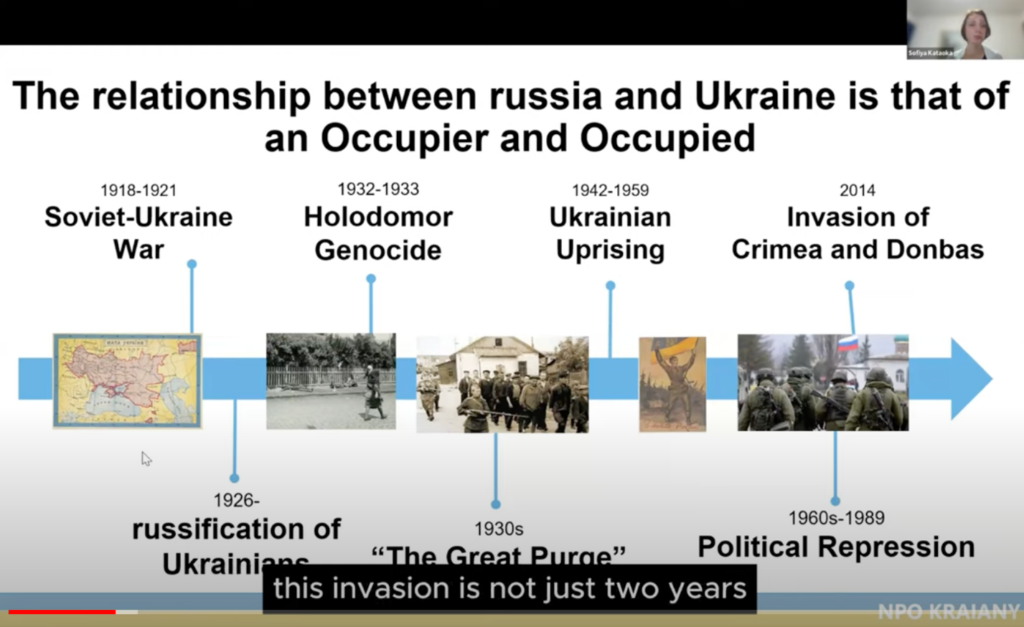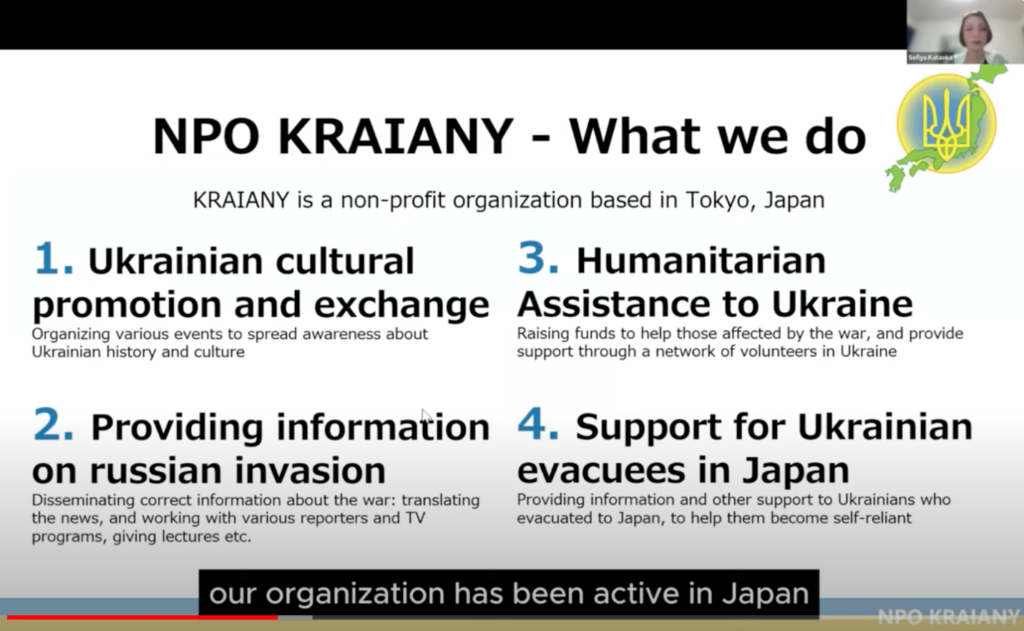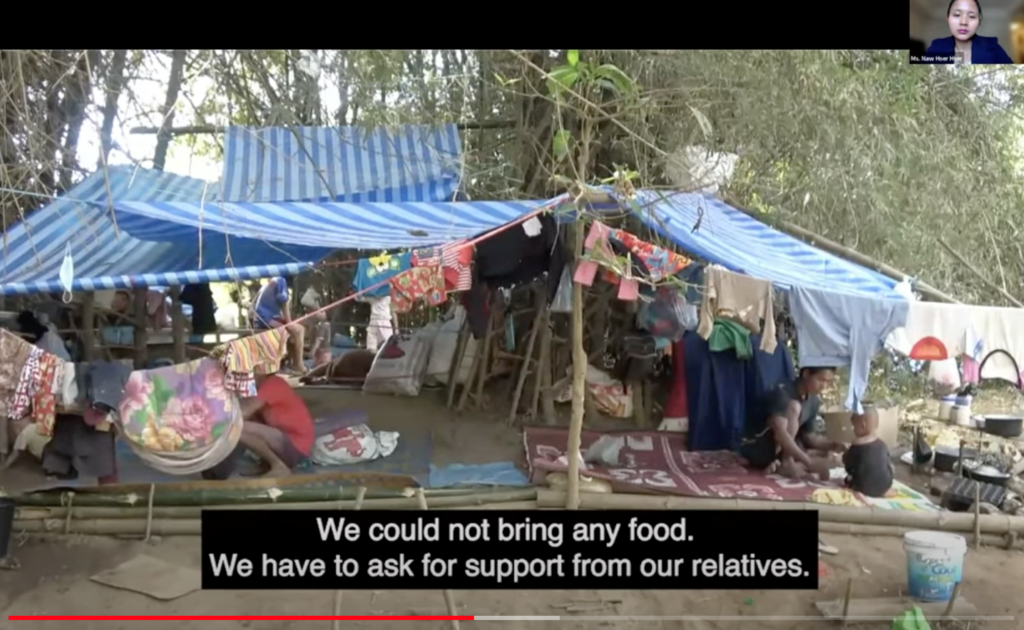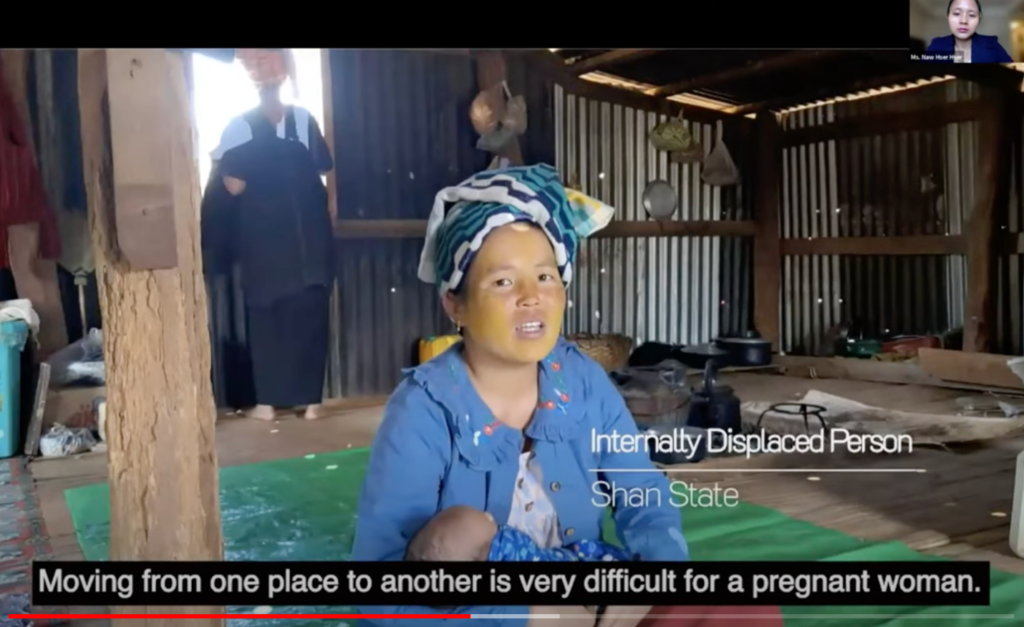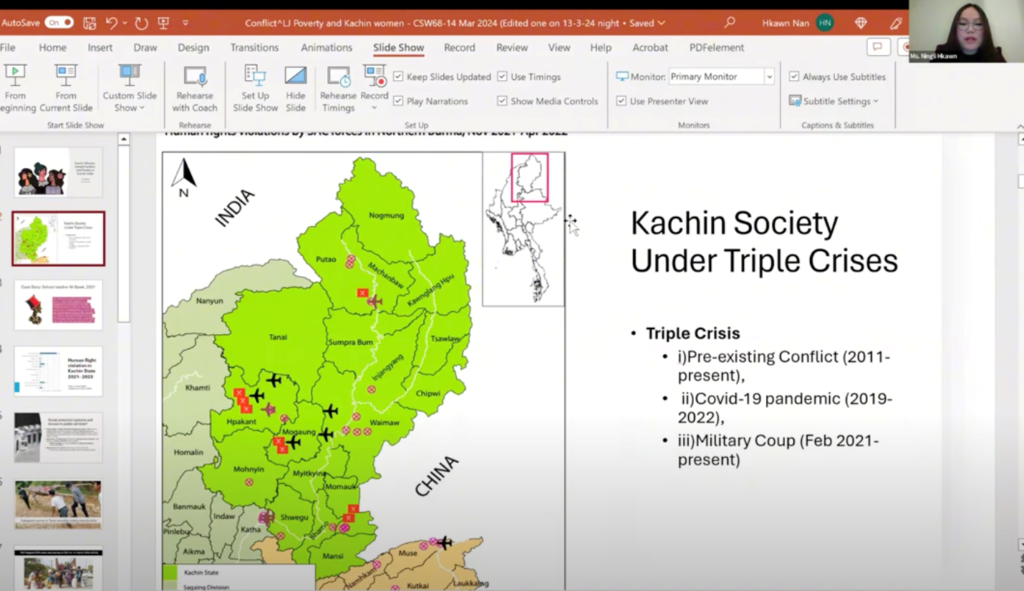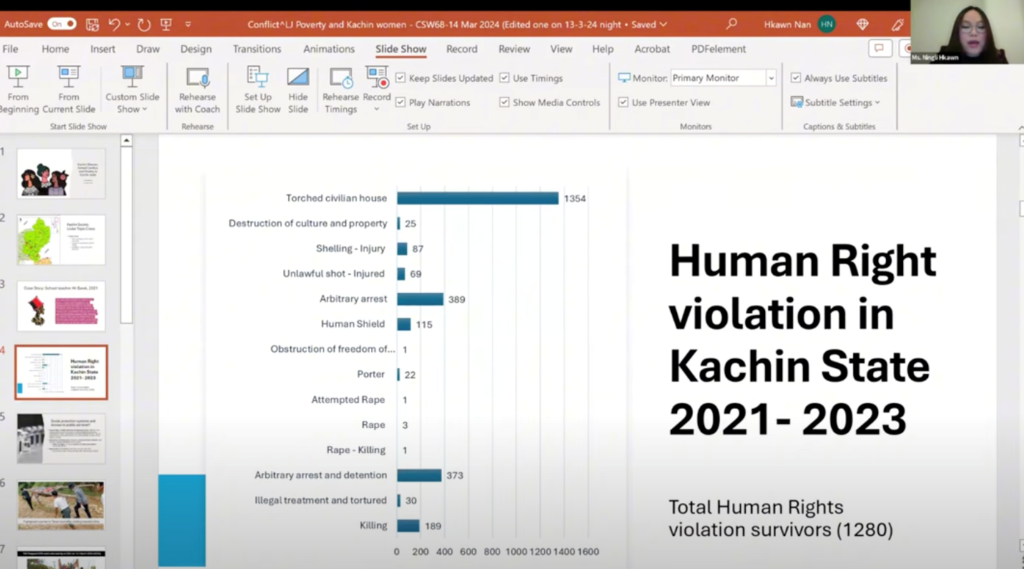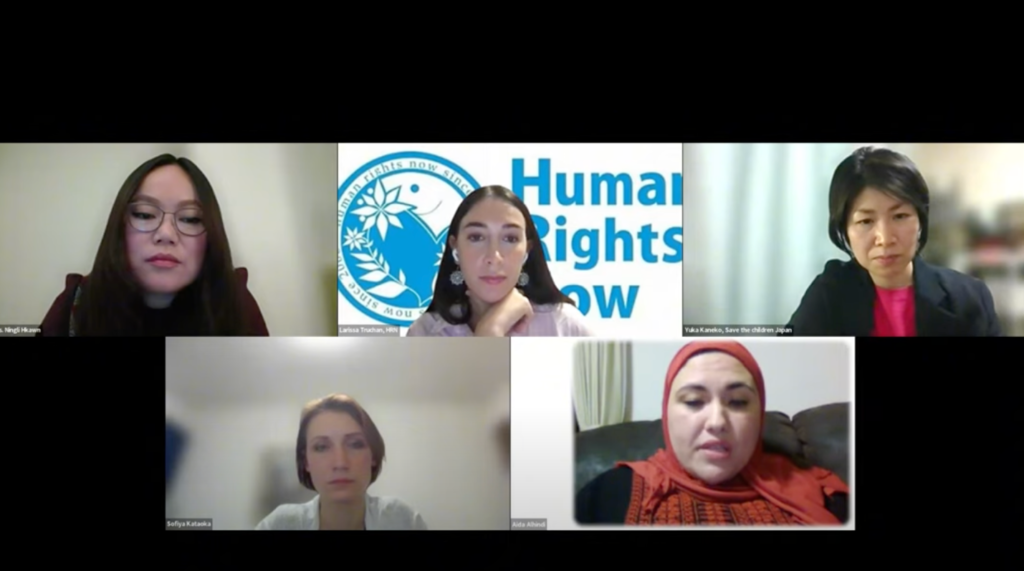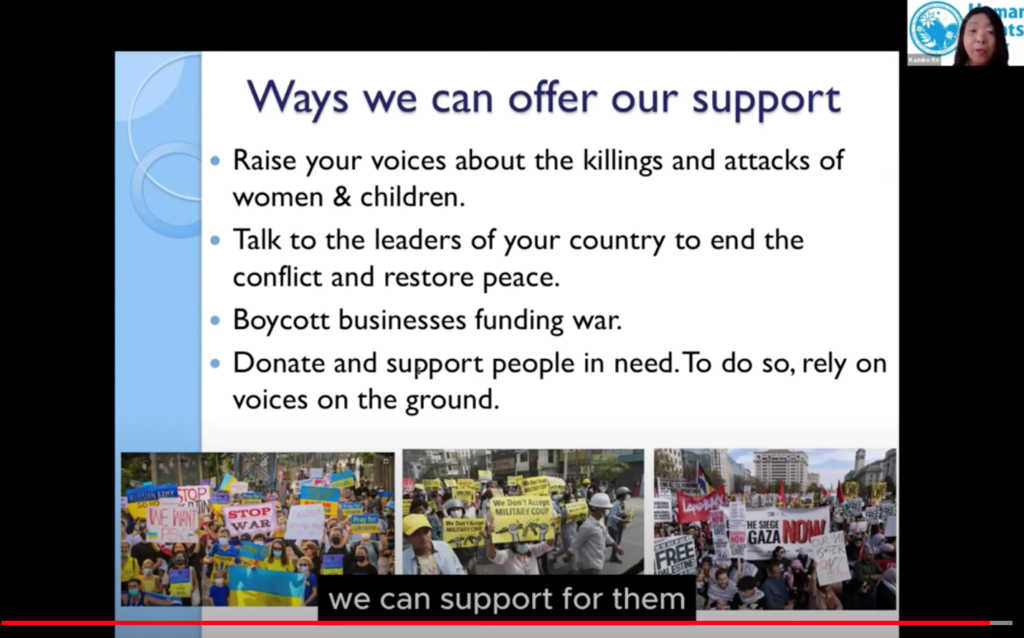On March 14, 2024, Human Rights Now (HRN) hosted a Zoom webinar as part of the NGO CSW68 Forum held between March 10-22, 2024, in parallel to the 68th session of the United Nations Committee on the Status of Women (CSW).The webinar focused on the ways in which gross violations of human rights during armed conflict seriously affect the lives and living conditions of women in girls, including their socioeconomic status and opportunities, particularly in regards to the ongoing conflicts in Gaza, Myanmar, and Ukraine. In relation to the conflict affecting them directly, the panelists discussed how justice, conflict resolution, and gender sensitive support can contribute to the progress of women and girls affected by armed conflict.
A summary of each panelist’s presentation can be found below.
Panelists:
- Sofiya Kataoka: Board Member of NPO KRAIANY (Association of friendship Japan-Ukraine)
- Naw Hser Hser: Political Initiative and Advocacy Delegate of the Women’s League of Burma and Member Advocacy Director of Karen Women’s Organization
- Ningli Hkwan: Kachin Activist and Advocacy Team Member of the Kachin Women’s Association Thailand
- Aida Alhindi: Gaza native and founder of at-home food business Aida Makes
- Kazuko Ito: Founder and Vice President of Human Rights Now
Moderator:
- Larissa Truchan: UN Youth Representative of Human Rights Now-NY
Outline:
- Opening Remarks by Larissa Truchan of HRN-NY
- Presentation by Sofiya Kataoka of NPO KRAIANY
- Presentation by Naw Hser Hser of Women’s League of Burma and Karen Women’s Organization
- Presentation by Ningli Hkwan of Kachin Women’s Association Thailand
- Oral Statement by Aida Alhindi of Aida Makes
- Closing Remarks by Kazuko Ito of Human Rights Now
Opening Remarks by Larissa Truchan of Human Rights Now-NY
Larissa Truchan has been the UN Youth Representative for Human Rights Now-NY for the past three years. She opened the webinar by posing an icebreaker question to the panelists, “What is one thing that brought you joy, this week or today?” Larissa reminded the viewers and the panelists that during tiring and oftentimes frustrating weeks of attending United Nations meetings with little actual progress on the ground or even backsliding on women’s rights and gender equality in our communities around the world, it is important to find joy and share in this joy with each other.
UKRAINE: Presentation by Sofiya Kataoka of NPO KRAIANY
Born in Kyiv, Ukraine, Ms. Sofiya Kataoka has called Japan her home since 1993. She is currently a Board Member of NPO KRAIANY (Association of friendship Japan-Ukraine), where she actively engages in initiatives aimed at fostering a deeper and more accurate understanding of Ukraine’s current situation. Ms. Kataoka’s presentation focused on how Russia’s armed conflict and ongoing occupation of Ukraine has affected Ukrainians on the ground, particularly women and children.
Ms. Kataoka opened her presentation by clarifying that February 2024 marks ten years of Russian aggression against Ukrainian civilians, starting with Russia’s 2014 annexation of Crimea. Rather than Russia acting as a “brotherly nation” to Ukraine, as Putin claims, Ms. Kataoka explained that Russia and Ukraine’s relationship is one of “occupier” and “occupied.” Between 2014 and 2021, around 1.7 million Ukrainians were internally displaced, and many Crimean Tatars and pro-Ukrainian activists were subjected to violations of civil and political rights, as well as torture and cruel treatment, especially at detention centers.
With Russia’s full-scale invasion of Ukraine on February 24, 2022, Ms. Kataoka explained that Russia’s initial invasion of Ukraine in 2014 was amplified. As a result, by official figures, over 10,000 civilians, including over 500 children, have been killed since February 24, 2022, and over 18,500 have been injured, not including the occupied areas of Ukraine. The most vulnerable groups affected by Russia’s full-scale invasion have been women and children, particularly in regard to the risks of: 1) poverty, 2) Human Trafficking, and 3) Lack of Education.
- The Risk of Poverty on Ukrainian Women and Children
As Ukrainian men are sent to the frontlines to fight, Ms. Kataoka highlighted that women are substituting men in the workforce to care for themselves and their children. However, among unemployed Ukrainians seeking work in the country, 75% are women. Outside the country, Ms. Kataoka noted that Ukrainian refugees face language barriers and difficulty accessing childcare. All of this puts women at a greater risk of experiencing poverty.
- The Risk of Human Trafficking on Ukrainian Women and Children
As of February 24, 2024, around 3.7 million Ukrainians have been internally displaced, 6.5 million Ukrainians are now refugees, and 14.6 million Ukrainians are in need of humanitarian assistance. Ms. Kataoka emphasized that these high levels of displacement place women at a greater risk of human trafficking, as a perpetrator may approach a Ukrainian refugee posing to help, gain their trust, and then use this to their advantage to subject that refugee to sexual harassment and sexual violence. Inside Russian-occupied areas of Ukraine, there is also reports of the systematic use of rape and sexual violence against Ukrainian women and children, as well as mass graves including these vulnerable groups.
- The Risk of Lack of Education on Ukrainian Women and Children
As a result of Russia’s illegal attacks on civilian infrastructure, including damage/destruction to at least 3,790 educational facilities, Ms. Kataoka explained that many schools have been forced to close. Further, the essential prioritization of survival over schooling continues to pose a huge risk to access to education for children in Ukraine. Ukrainian children in Russian-occupied areas of Ukraine have also been forced to attend “re-education camps.”
Ms. Kataoka emphasized that this sort of violence, particularly aimed against women and children, indicates that Russia’s full-scale invasion is not simply an armed conflict, but rather a genocide against Ukrainian people to erase Ukrainian identity and the Ukrainian nation completely. The work of NPO KRAIANY, based in Tokyo, Japan, aims to help Ukrainians facing these rights violations by:
- Facilitating Ukrainian cultural promotion and exchange;
- Disseminating verified information to the public on the Russian invasion;
- Providing humanitarian assistance to Ukrainians on the ground; and
- Supporting Ukrainian evacuees in Japan.
MYANMAR: Presentation by Naw Hser Hser of Women’s League of Burma and Karen Women’s Organization
As a human rights defender from Myanmar who has been working to advance women’s rights and end the system of impunity for over 15 years, Ms. Naw Hser Hser currently serves as the Political Initiative and Advocacy Delegate of the Women’s League of Burma and Member Advocacy Director of Karen Women’s Organization. Her presentation focused on the situation in Myanmar, particularly in regard to women and girls, and how these vulnerable groups survive and have been fighting to end military dictatorship since the 2021 coup in Myanmar.
To provide context for the armed conflict in Myanmar, Ms. Hser Hser explained that since the 2021 coup, over 4,000 civilians have been killed, including 800 women and children, at the hands of the military junta. This figure includes around 400 civilians, including 130 women, who were burned alive. Further, over 3 million civilians have been internally displaced in Myanmar since 2021, and the conflict remains daily and ongoing.
To show viewers the situation of Myanmar on the ground today, Ms. Hser Hser played a video clip depicting the humanitarian impacts of armed conflict on women and children in Myanmar. The video displayed the situation on the ground for the thousands of women and children living in shelters created with bamboo and tents, unfit to withstand Myanmar’s heavy rainy season, who have been displaced due to the armed conflict by the military junta.
The women featured in the video explained how every aspect of their lives is now controlled by the military junta — from the military checkpoints they must constantly pass through with fear, to the vegetables they are allowed to grow to sustain their livelihoods, to the high costs of basic necessities such as water and cooking oil, to the accessibility of medicine for pregnant women and their children. Children are further affected by the lack of access to education, as schools have been destroyed by the junta. Unfortunately, cross-border humanitarian assistance is the only way to transport aid into Myanmar, which rarely reaches conflict-affected populations in the midst of the fighting.
Regarding gender-based violence and sexual violence in Myanmar, Ms. Hser Hser added that sexual violence and sexual harassment, including rape, has systematically been used as a weapon by the junta since 2021. Because there does not exist any mechanism to report these sexual crimes or justice system to hold violators of these sexual crimes accountable in Myanmar, Ms. Hser Hser noted that perpetrators of sexual violence in Myanmar have been referred to the International Criminal Court.
MYANMAR: Presentation by Ningli Hkwan of Kachin Women’s Association Thailand
As a distinguished Kachin activist from Myanmar with over 15 years of experience working in human and women’s rights, Ms. Ningli Hkwan currently serves as a member on the Advocacy Team of Kachin Women’s Association. Ms. Hkwan’s presentation focused on the impacts of armed conflict on women and girls particularly in the Kachin State of Northern Myanmar.
Ms. Hkwan explained that the Kachin State of Northern Myanmar has been subjected to triple crises, including pre-existing conflict beginning in 2011 that continues until today, the Covid-19 pandemic from 2020-2022, and the military coup from February 2021 until today. Ms. Hkwan shared that her hometown is currently trapped by the junta, meaning nobody can enter or leave the town. As a result, her mother is in the process of fleeing her hometown in search of safety.
Between 2021 and 2023, Ms. Hkwan noted that thousands of civilians have been subjected to various human rights violations at the hands of the military junta, including the torching of civilian homes, arbitrary arrests and detentions, and extra-judicial killings. Kachin women, in particular, are currently unable to access and receive public services, such as healthcare, transportation, electricity, and the justice system, as the government and all of its functioning has been halted by the military junta since the 2021 coup. As a result, Ms. Hkwan revealed that 6 out of 10 women have experienced a fall in their income since the 2021 coup; women between 31 to 39 years of age have reduced their food intake due to less income; and women have been particularly at risk of human trafficking to different regions of Myanmar or to China.
To demonstrate the evolving economic situation for women in the Kachin State, Ms. Hkwan featured a quote from a rural woman in the Kachin State:
“We don’t have man in our village anymore, they are gone to join ethnic armed forces or migrate to neighboring countries, now women are taking on manual labor and daily-wage jobs.”
Ms. Hkwan ended her presentation by sharing the Kachin Women’s Association Thailand’s recommendations to empower women in the Kachin State of Myanmar, including by:
- Supporting mental health and human rights initiatives through increased funding;
- Advocating for accountability, including investigation and prosecution of perpetrators of war crimes;
- Elevating women’s voices by prioritizing the perspective of women survivors of human rights abuses;
- Providing cross-border aid and support to victims of human rights abuses through collaboration with local ethnic administrations and community groups;
- Implementing economic sanctions targeting the military regime;
- Ceasing forced recruitment by exerting pressure on all armed actors; and
- Engaging in Federal Democracy building to encourage governments and donors to participate in the creation of a new Federal Democracy in Myanmar.
PALESTINE: Oral statement by Aida Alhindi of Aida Makes
Through growing up in Gaza, Ms. Aida Alhindi experienced firsthand the rich tapestry of Palestinian culture and the resilience of its people. Proud to share her heritage through her passion for creating delicious Palestinian cuisine, Ms. Alhindi founded a small at-home food business, Aida Makes. Ms. Alhindi’s oral statement focused on the human rights violations that women and children are bearing the brunt of as part of Israel’s ongoing genocide of Palestinians.
Ms. Alhindi emphasized that the situation in Gaza right now is not just a humanitarian crisis, but an ongoing assault on the humanity of Palestinians, of which at least 40,000 have been murdered by Israel since October 7, 2023. She recognized the thousands of Palestinians locked up in Israeli prisons, including women who are forced to ensure beatings and rape from behind bars. Ms. Alhindi further noted Israel’s deliberate deprivation of basic necessities allowed to enter Gaza, which has resulted in mass suffering, starvation, and dehydration. Without medical equipment and essentials, pregnant women have had to give birth without medication and children have had to ensure surgeries and amputations without anesthesia.
Ms. Alhindi ended her oral statement with a powerful call to the international community:
“This is not just a crisis, it is a calculated campaign of cruelty. It is a systematic effort to extinguish hope, dignity and life itself from an entire population. Such atrocities demand our immediate and unwavering condemnation and they compel us to act with urgency and resolve. Let us stand together, united, in our condemnation of these unspeakable crimes, and let us work tirelessly towards a future where every individual, regardless of their circumstances, can live with the dignity, rights, and opportunities they deserve.”
Closing Remarks by Kazuko Ito of Human Rights Now
An active Tokyo-based human rights lawyer dedicated to women’s and children’s rights, criminal justice and the death penalty, and public interest litigation in Japan as well as critical human rights issues around the world, Ms. Kazuko Ito is the Founder and Vice President of Human Rights Now. Ms. Ito’s closing statement focused on the work on Human Rights Now in Ukraine, Myanmar, and Palestine to protect and promote the human rights of people on the ground in each of these conflict-ridden areas.
Regarding Ukraine, Human Rights Now has released various statements on the conflict in Ukraine, emphasizing great concern for the situation of women and children. Human Rights Now has also participated in the B4Ukraine Campaign, a coalition of NGOs advocating for transnational companies to withdraw from business in Russia.
Regarding Myanmar, Human Rights Now sent a mission to engage with activists in Myanmar in January 2024 and understand the situation of armed conflict on the ground. Human Rights Now recommends that the UN Human Rights Council act accordingly; that the UN Security Council adopt a strong resolution to end the military junta’s illegal rule, and that States around the world, including Japan; and withdraw foreign business and development aid to Myanmar.
Regarding Palestine, Human Rights Now supports the International Court of Justice’s orders to Israel, which Israel has chosen to ignore by continuing attacks and impeding the delivery of humanitarian aid. Human Rights Now calls for an immediate ceasefire; the immediate provision of accessible and sufficient humanitarian aid in Gaza; and the immediate release of all hostages.
Ms. Ito closed the webinar by offering ways that viewers can support the situation of women and girls in Ukraine, Myanmar, and Palestine, including:
- Raising your voice about the killings and attacks of women and children;
- Talking to the leaders of your country to end the conflict and restore peace;
- Boycotting businesses funding war; and
- Donating and supporting people in need by relying on voices on the ground.




